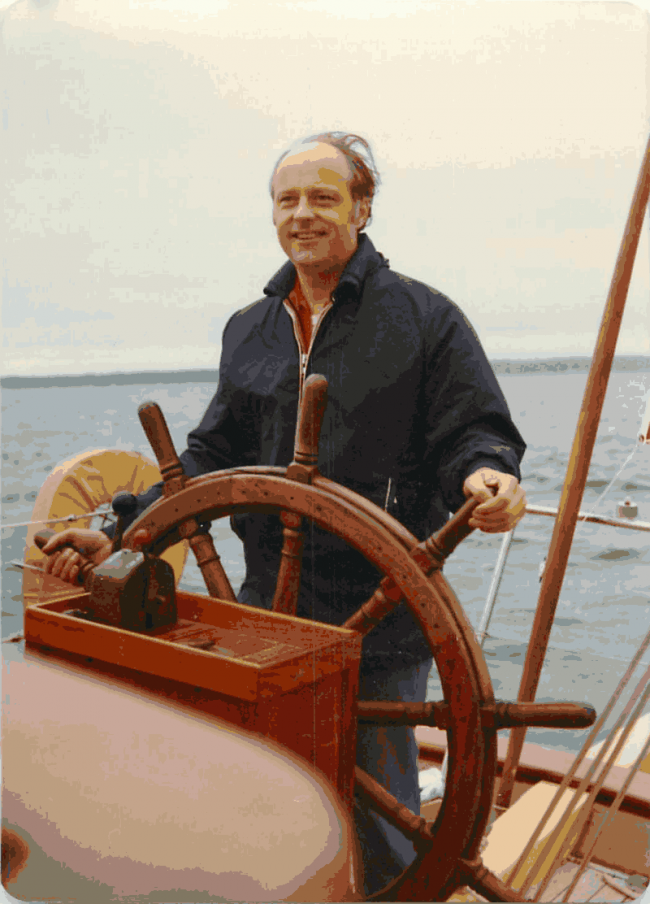An Untold Life: Alan Schmitz
Alan Schmitz sailing.
Tue, 09/03/2013
By Maggie Nicholson
In 1934, twins were born to a Swedish couple named Axel and Anna. Anna died in childbirth, and Axel gave the boy and girl up for adoption. They were taken in by Dietrich and Peggy Schmitz. The process was different in the thirties; Alan and his twin sister Margaret Ann’s birth certificates read that they were born to the Schmitz family. When they were five, their birth father Axel was killed in a work accident, digging a well in Kirkland.
Alan was close with his twin Margaret Ann. Dietrich and Peggy had adopted a daughter five years earlier, named Gloria. She was free-spirited and lively, a loving sister. Dietrich and Peggy lived in a large residence on Alki neighboring Dietrich’s parents’ home: a Bavarian style mansion, brown with white trimming, looming high above the ground. Alan’s grandparents Ferdinand and Emma were West Seattle pioneers. They arrived in 1887 from Germany and settled a homestead on the land that is now Me-Kwa-Mooks Park. The area is filled with dense pine trees and hidden screech owls. Directly across from the park is an overlook named for Emma: during low tide it is ripe with sea stars, lumpsuckers, sea cucumbers and other intertidal creatures.The family produced food during war-time rationing. Fruit trees burst like red candles, vegetables were harvested from the garden, chickens roamed and grew old; even alcohol was distilled there.
Alan lived his whole life in West Seattle. He learned to sail from his father Dietrich, who taught him in a long, teak wood sailboat. Alan’s father Dietrich was a successful man. He served as President of Pacific National Bank, chairman of Washington Mutual Savings Bank and member of the Seattle School Board for 31 years, becoming President eight different times. Alan became an Eagle Scout, learning to love nature from his parents. He camped mossy crevices all along the Pacific Northwest. He learned to bird watch from his mother, Peggy. Their home on Beach Drive was cream colored and swallowed by nature. On every side of the home was a window into a separate habitat, filled with various forest birds: blue jays, owls, woodpeckers. Peggy taught the bird watching badge to Eagle Scouts. At the top of the driveway, she gardened rhododendrons. They had a steep driveway, and she had heaters installed to deter winter ice. Alan loved to garden with his mother, especially rhododendrons.
He attended the University of Washington to study business, and met an English major named Vicki. They fell in love, married and had two children: Julie and Dietrich. Alan took his son Dietrich on long camping trips at least once a year. They hiked the wet zones of the Olympic Mountains, where rain was blue as an iris, unmoved and thick. They hiked and slept under the foggy star-filled sky for five to six days at a time. “Bearded moss hung down from the trees like green tapestries,” recalls Dietrich.
Once, the two awoke to a tiny mouse darting through the blankets and sleeping bags. Alan was so startled, screaming and scurrying through the tent, that though Dietrich was also scared, he kept calm the whole time. Alan was scared enough for the both of them, laughs Dietrich.
The whole family often traveled together to Mt. Rainier. On the way home, Alan would have them stop for a slice of blackberry pie. The couple also owned a cabin in the Cascades at a ski resort near Seattle. A wood fireplace crackled inside, drying their wet socks after long days of skiing. It was bright orange and metal. Smoke furrowed from the top.
Alan tried his hand in a number of fields. He went into banking, sold bonds, owned a company that sold board games, and was even a certified hypnotist. In the late ‘80’s he was a power-lifter. His son remembers an old photograph of Alan lifting a very heavy weight, his eyes gigantic. Later in life, Alan worked as a fitness instructor for seniors. He taught all the way up until the month he was hospitalized.
Alan was kind to everyone, and a humble man. He was a member of the Rotary Club for thirty years. One year, while attending their awards ceremony, he left halfway through to get dinner. The awards were given out in order from minor to major. He was hungry and certain he hadn’t won a major award. While eating, he received the news he had won the biggest award of all: Rotarian of the Year.
The Schmitz family donated a large amount of land to the city of Seattle: a 40-acre plot in West Seattle known today as Schmitz Park, the Emma Schmitz Overlook, Me-Kwa-Mooks Park, as well as the land where Schmitz Park Elementary School stands today. Alan’s father Dietrich always spoke on the first day of school at Schmitz Park Elementary. When Dietrich passed away, Alan took his place, educating the young students on the history of where their small feet were standing that very day.
Alan passed away in March of 2012. The rhododendrons he gardened continue to grow where his hands once planted them, stretching their red faces upward toward the sun.



![Alan [left] with father Dietrich [middle] and twin, Margaret Ann [right], on the day of their high-school graduation.](/sites/default/files/styles/article_gallery_thumb/public/images/wwwwestseattleheraldcom/2013/09/alan.png?itok=X_lwTcBG)


